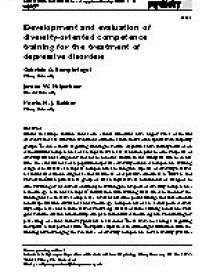Development and Evaluation of a Diversity-Oriented Competence Training for the Treatment of Depressive Disorders.
Studies in Europe indicate that some ethnic minorities have higher rates of mental disorders and less favorable treatment outcomes than their counterparts from majority groups. To date, efforts regarding training to reduce disparities have mainly focused on ethnocultural competences of therapists, with less attention paid to other aspects of diversity, such as sex/gender and socioeconomic status.
In this study, we aim to determine the effectiveness of a population-specific, diversity-oriented competence training designed to increase therapists’ competencies to integrate aspects of diversity features in clinical assessment, diagnosis, and treatment of depressive disorders in Turkish- and Moroccan-Dutch patients.
A group of 40 therapists were location-based assigned to either training or a control condition (no training). Self-reported diversity competence, a knowledge test, and therapists’ satisfaction with training were used to monitor the training and to measure competence levels at baseline, post-training, and three-month follow-up. Attitude-awareness and knowledge components of the self-reported diversity competence and test-measured knowledge increased in the training condition.
Most gains remained stable at follow-up except test-measured knowledge after controlling for percentage of ethnic minority patients in caseload. There were no changes regarding therapists’ self-reported skills. Therapists expressed medium–high satisfaction with the training, acknowledging the relevance of diversity competence for their daily practice. Future training must ensure better adjustment to therapists’ pre-existing knowledge and be followed by long-term efforts to maintain competence levels and enhance competence transfer within teams.
In: Transcultural Psychiatry, ISSN 1363-4615 | 55 | 1 | 31–54
https://doi.org/10.1177/1363461517725224


